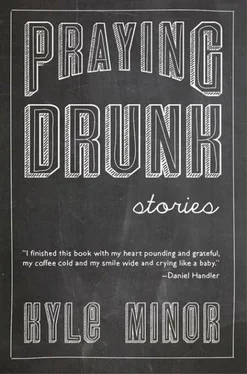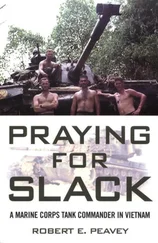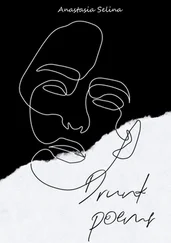It was a spooky feeling, hearing words like that coming from her.
“Nobody’s dead,” T. C. said. He didn’t like her, but you couldn’t tell it in his voice, not then. His voice was gentle, fatherly. He reached out his arms and took a step toward her. She took a step back and shut the door softly. The wood grazed his fingertips.
A coldness came into us, then. Later, T. C. said it was the conviction of the Spirit resting on us because of how we had neglected Sheila, but I can’t shake the superstition I want to shake, which is that it was our spirits knowing Sam and Brother Joe were gone, before our minds could know it. What happened, in any event, was we picked up bags of rice and carried them to the place just inside the gates where we had carried them before. We carried the salted meats and the vegetables, and we carried the boxed provisions. Then we waited. This was the worst of it. We waited and waited, but neither Sam nor Brother Joe returned.
Sometime around dawn, Henri came knocking on the gates, calling for T. C. and me. When we saw his face, we knew. He said we better come help him collect the bodies. All I could think of was that old homeless lady Marie who died last year out in front of Le Dieu de Justice school and we thought she was just sleeping on the steps again, and how crazy old Jean Sitney covered her with his black blanket, and when her people never did come to take the body, he started dancing with it, round and round in circles, until the schoolchildren stopped him by throwing rocks at his arms and body.
T. C. went over to the place by the mission wall where Sam cultivated the sugar cane, and threw up into it. When he was done, he wiped his mouth, and said, “You gonna go tell Sheila, or you want me to?”
It didn’t seem right to make him do it. I knocked on her door again, and as soon as she saw my face, she knew. I could tell. Her voice was flat. “Where?” she said, and I told her the water station. She pushed me aside and took off running, flat-out running, past me, past T. C. and Henri, through the gate, and out into the village.
There was no catching her. Maybe Henri could’ve caught up with her, but maybe he was as soft as we were, spending his days driving that truck instead of walking up and down the hill for water, instead of walking everywhere, the way most people do who don’t live in the mission. The only person in the whole place who could’ve run from here to the water station was Sheila herself, because she was the only one out running around the village all the time.
The three of us didn’t say anything to one another. We just started walking. We walked in a triangle, me and T. C. up front, and Henri, watchful, bringing up the rear. We walked through the village, all the way to where the good dirt path ended, up the mountain, and down again, toward the fresh springs where the people washed and bathed.
You could see the water station busted up from far away. It looked like they had come at it with hammers and axes and pieces of wood. Whatever they could get their hands on. Later we found a young tree that had been pulled up by the roots and swung like a baseball bat. And from that distance, already, we could hear Sheila wailing. She did not sound like herself, but her voice was not strange. She sounded like almost any Haitian woman I had ever seen bent over the body of a lost father, a lost husband, a lost baby. Wailing.
We followed her voice to the far end of the water station. She was knee-deep in the stream. Chunks of concrete and scraps of wood and PVC pipe floated around her or lay in the shallows. Her whole body was leaned over what was left of Sam. Her arms were under his shoulders, holding his head out of the water. Her forehead dipped in and out of the stream. She was shaking with cold. When we came closer, we saw that the left side of Sam’s face was completely caved in.
I had to shout to be heard over the sound of the stream, and her wailing. I said, “Where is Brother Joe?” I asked three times, but she did not answer. She may not have known we were there until T. C. came behind her and put his arms around her. Even then, she did not let go of Sam’s body. Some ways downstream, I caught sight of Brother Joe bobbing face down among the reeds. I left Sheila with T. C., and waded toward him, to fish him out of the water. His face was caved in, too. Upstream, T. C. was saying, “He’s with Jesus, Sheila. He’s with Jesus.” I don’t think I’ll ever see a sight like it again, T. C. holding Sheila, Sheila holding Sam’s body, the three of them in the water, bobbing amid all that trash.
IV.
Mrs. Linda Reelitz, Okap Baptist Ministries, Cap-Haïtien, to Rev. Ervin Medlock, Caribbean Region Director, Foreign Mission Board, Richmond, Virginia, May 10, 1986.
I’m sorry it has taken so long to get back with you about this Sheila Tillotson affair. MFI is only running every-other-Tuesday flights out of Cap-Haïtien, and those are Palm Beach hops, with Santo Domingo stops midway. So the fastest cheap way into Port-au-Prince is Okap to Santo Domingo on Tuesday morning, then the Thursday afternoon flights to Port with the Presbyterians. On the way back, it was the Presbyterians to Santo Domingo, then (lucky, this) a helicopter full of anthropologists from Johns Hopkins who thought it would be a hoot to pal around with a missionary woman for a while. (Some anthropologists they were, too. One of them asked why I wasn’t wearing my habit. I asked him if I needed to explain to him the difference between the Baptists and the papists, and he held up his hand as if to say, “The vocabulary offends.” In my mind, he says it with a British accent, but we’re hard up for fun around here. In truth, his talk was Chesapeake Bay all the way.) All told, Ervin, and even with all the rushing around, this errand of yours cost me almost three weeks. I’d say you owe me, but I guess you can’t owe me if I didn’t come back with anything.
The Koulèv-Ville mission is in surprisingly good shape. I say surprisingly, because since the Duvaliers fled on that plane (smuggled out a little peasant girl with them, they did! to do the cooking and cleaning no doubt), very little that has been in any way associated with the regime has been left untouched. All the way from the airport, through the city, through Pétion-Ville, Henri (their driver) pointed out the various signs of carnage. The burnt shell of a building here, the bourgeois house overrun by shanty people there. It made me fear for what I would find, because tensions in the country are still running high, and even in Okap it was known that Brother Joe had dealings with the regime.
But you and I know Brother Joe was a shrewd man, and he had his people do a shrewd thing. When the lawlessness flared up, instead of hunkering down right away, they first dragged much of their excess food and sundries outside — bags of rice, cooking oil, salted meats, vegetables — and let the people take them, knowing what goodwill would follow. Where Brother Joe went wrong, I would say, is in miscalculating the limits of that goodwill. This was a failing, I believe, to which he was prone, expecting big goodwill when all you are is a person who invites a little goodwill. Down there by the hospital are rows of mango trees, where me and Ed spent some pleasant hours back when I was young and Ed was still alive. That’s where I expected to find this Sheila, bent semi-comatose over old Sam’s grave. But all I found there were those two pet monkeys they used to keep in those tiny cages before they dismantled the mission zoo. They wore harnesses, and they had been tied to the tree trunks by the old man who parades them in the street with their tin beggar cups whenever any work groups — American or Dutch, he does not discriminate — are in town doing their good deeds. It’s a real breach of protocol, not to mention security, that the monkey man could get away with a thing like that, and it never would have happened in Brother Joe’s day. Nor would there be a hole in the mission wall near the garbage dump, so people could reach in and grab the trash bags and dump them on the property next door and claim their chicken bones and whatnot. Nor would there be dirty hospital needles in those bags like the ones I found among the wads of befouled toilet paper, the discarded food wrappers, the slit-cut burlap rice sacks I watched children carrying away at the direction of their mothers. Brother Joe would have stood over the shoulders of the orderlies as they dug a pit, built a fire, burned everything infectious, covered the hole with the dirt they had just finished digging. If he so much as saw something so useful as a burlap sack in a garbage can, he would have fired the cook on the spot, and made somebody’s wife finish making the meal.
Читать дальше












